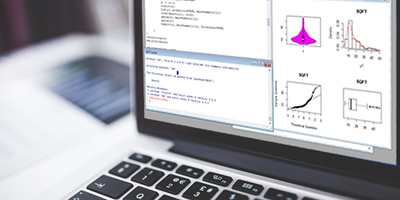- PROGRAMS
- Data Analysis using R
Data Analysis using R
Compare
Apply
Short Overview
This program offers an introduction to R, together with a quick introduction to basic statistical concepts and methodologies. It presents ways to use R for statistical data analysis with applications, as well as modern data management problems that occur in practice.
Learning Goals
The use of data for decision support is constantly increasing, so the need for the use of appropriate computational tools is increasing rapidly. R language is an important tool for data analysis. This program provides an introduction to R and data analysis with R, so that the learner can gain experience in both data analysis and R.
Program Value
The statistical language R is a valuable tool for data management, but mainly for statistical analysis that includes cutting-edge modern methodologies. R is an open-source language where anyone can contribute by developing libraries that implement statistical methodologies. This has created a huge impact to research with a huge pace of development. At the same time R has high quality graphics making it an important data visualization tool. Therefore, there is an immediate need to educate and train a large number of students and graduates in R, who until now, have relied on the use of click based commercial statistical software. At the same time, the development of methodologies for the analysis of large volumes of data, but also the developments in both statistical science and other related sciences lead to the need for training in R and its capabilities.
Evaluation Method And Final Grade Computation
The assessment is based on the completion of exercises or assignments on a weekly basis and the completion of a final paper, in which the learner will have to submit an extensive data analysis task using R using real data. Successful completion of the program and the awarding of the training certificate requires a final grade of at least 50%.
Learning Method Description
The program uses the eLearning educational method: learning takes place purely asynchronously (that is, on days and hours that serve the trainee, without mandatory attendance at a specific time or day), exclusively remotely (using a special educational platform via the internet from the trainee's area) and using digital educational tools that ensure effective and flexible individual self-learning. The program's training material becomes available at specific time periods, based on the training path followed, and then remains available on the training platform without restrictions throughout the duration of the program.
Teaching Language
Greek
Application deadline: 11/02/2026
Program start: 18/02/2026
Program completion: 10/05/2026
Scientific area
Way to follow
ECTS units: 4
Hours of asynchronous training: 40
Includes training hours (indicative) using an asynchronous distance learning (eLearning) platform.
Includes training hours (indicative) using an asynchronous distance learning (eLearning) platform.
Additional hours of employment: 80
Additional hours of work are included (indicative) and may include individual study, writing assignments, participation in field visits, participation in exams, etc.
Additional hours of work are included (indicative) and may include individual study, writing assignments, participation in field visits, participation in exams, etc.
Total hours: 120
The total hours include hours of synchronous and asynchronous training, as well as additional hours of employment.
The total hours include hours of synchronous and asynchronous training, as well as additional hours of employment.
Weeks of training: 10
Weeks in which activities of any kind are planned are included.
Weeks in which activities of any kind are planned are included.
Vocational Education and Training Certificate
Trainees who successfully complete the program are granted a Vocational Education and Training Certificate of the Center for Education and Lifelong Learning of the Athens University of Economics and Business, which is accompanied by a Supplement to the Certificate, detailing the subject of the program, the thematic units attended by the trainee , as well as the training methodology followed.
Center Technical Support, This email address is being protected from spambots. You need JavaScript enabled to view it., , 2108203754
Target Audience
- Students of Statistics or related departments who want to learn the R language.
- Graduates of Statistics departments from the past where R was not widespread and not part of the curriculum.
- Graduates of Statistics departments from recent years who were either not taught R or would like to learn deeper.
- Graduates of Mathematics departments who, while they have been taught theoretical courses, have little familiarity with the use of statistical programs such as R.
- Employees who in their daily life need to analyze data and use R.
- Researchers from various other subjects who need both statistical methods and the use of R for their research.
Prerequisite Knowledge
- Basic knowledge in statistics (as, i.e., that gained by a university course)
- basic computer usage (browsers, spreadsheets, word processors, email)
Scientific Coordinator
Program Tutors
Mode And Frequency Of Communication
Communication between trainers and trainees is mainly asynchronous, through emails and/or personal messages through the training platform. However, a limited number of teleconferences are planned, to resolve questions and related issues.
Cost
ELEARNING: 300€
Installements
The tuition is €300 and is paid in two installments. The first installment, of €150, is paid as an advance before the start of the courses, to secure the place, and the second, of €150, is paid before the program is half completed. In the event of a discount, the above amounts are reduced proportionally. Especially in the case of a 20% discount, the above amounts are set at €240 (total amount), €150 (first installment - ??advance payment) and €90 (second installment).
Trainees are informed of the installment amounts and related deadlines via email upon their acceptance into the program.
CONTACT
45, Kefallinias Str., 11257, Athens
-
dummy secretariat@diaviou.aueb.gr
-
dummy+30 210 8203 913
For the in Class programs:
-
dummydiazosis@diaviou.aueb.gr
-
dummy+30 210 8203 916, 912, 914
For the eLearning Programs:
-
dummyelearning@diaviou.aueb.gr
-
dummy+30 210 8203 753





